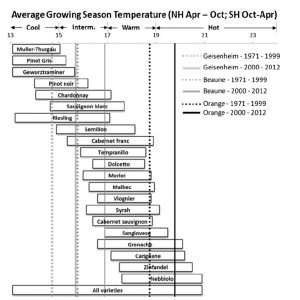l’article du mois – novembre 2013
 Why climate change will not dramatically decrease viticultural suitability in main wine-producing areas by 2050
Why climate change will not dramatically decrease viticultural suitability in main wine-producing areas by 2050
par VAN LEEUWEN, C., SCHULTZ, H.R., GARCIA DE CORTAZAR-ATAURI, I., DUCHENE, E., OLLAT, N., PIERI, P., BOIS, B., GOUTOULY, J.-P., QUENOL, H., TOUZARD, J.-M., MALHEIRO, A.C., BAVARESCO, L., DELROT, S.
in Proceedings of the National Academy of Sciences of the United States of America, Letter, 2013, 110 (33), E3051–E3052
Hannah et al. (1) recently published a comprehensive study showing substantial impacts of climate change on viticultural suitability, leading to potential ecological issues. We agree that expansion of viticulture into new areas can lead to a decrease in biodiversity and that an increase in water use for irrigation might lead to major freshwater conservation impacts. However, we disagree with the alarming statement that suitability for winegrowing of main wine-producing areas worldwide will dramatically decrease over the next 40 y. We point out major methodological flaws in ref. 1, mostly linked to (i) the misuse of bibliographical data to compute suitability index, (ii) underestimation of adaptations of viticulture to warmer conditions, and (iii) the inadequacy of the monthly time step in the suitability approach.
[…]
Hannah et al. make an interesting point in predicting which regions worldwide may become suitable for viticulture by 2050 as a consequence of climate change, and in estimating related potential ecological impact. However, their conclusion that most of the present wine-growing regions will become unsuitable for viticulture is erroneous.
- extrait:
- lien_externe:
- kc_data:
- a:8:{i:0;s:0:"";s:4:"mode";s:0:"";s:3:"css";s:0:"";s:9:"max_width";s:0:"";s:7:"classes";s:0:"";s:9:"thumbnail";s:0:"";s:9:"collapsed";s:0:"";s:9:"optimized";s:0:"";}
- kc_raw_content:
 Why climate change will not dramatically decrease viticultural suitability in main wine-producing areas by 2050
Why climate change will not dramatically decrease viticultural suitability in main wine-producing areas by 2050par VAN LEEUWEN, C., SCHULTZ, H.R., GARCIA DE CORTAZAR-ATAURI, I., DUCHENE, E., OLLAT, N., PIERI, P., BOIS, B., GOUTOULY, J.-P., QUENOL, H., TOUZARD, J.-M., MALHEIRO, A.C., BAVARESCO, L., DELROT, S.
in Proceedings of the National Academy of Sciences of the United States of America, Letter, 2013, 110 (33), E3051–E3052
Hannah et al. (1) recently published a comprehensive study showing substantial impacts of climate change on viticultural suitability, leading to potential ecological issues. We agree that expansion of viticulture into new areas can lead to a decrease in biodiversity and that an increase in water use for irrigation might lead to major freshwater conservation impacts. However, we disagree with the alarming statement that suitability for winegrowing of main wine-producing areas worldwide will dramatically decrease over the next 40 y. We point out major methodological flaws in ref. 1, mostly linked to (i) the misuse of bibliographical data to compute suitability index, (ii) underestimation of adaptations of viticulture to warmer conditions, and (iii) the inadequacy of the monthly time step in the suitability approach.
[…]
Hannah et al. make an interesting point in predicting which regions worldwide may become suitable for viticulture by 2050 as a consequence of climate change, and in estimating related potential ecological impact. However, their conclusion that most of the present wine-growing regions will become unsuitable for viticulture is erroneous.
